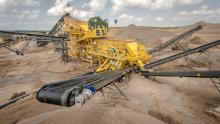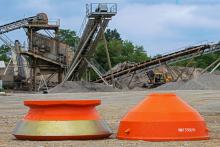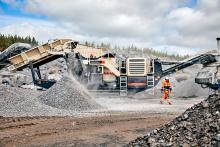No matter what type of crusher you have in your plant – Jaw, Cone, Impactor or VSI – maintenance will be at the heart of your process. If the crusher stops, the process stops.
Scott Campbell, Weir Minerals comminution aftermarket manager for Europe and North Africa, explains why regular maintenance is essential to your process and success.
[caption id="attachment_86750" align="alignright" width="462"] California-based FST Sand and Gravel Plant Materials has benefited from the knowledge and input of Weir Minerals' comminution experts[/caption]
California-based FST Sand and Gravel Plant Materials has benefited from the knowledge and input of Weir Minerals' comminution experts[/caption]
A crusher must not only reduce the feed rock in size, it must also produce a product that meets the size and shape requirements of your industry market, and if your operation supplies aggregate for concrete production then your customer will accept nothing but the best.
Crusher wear can be affected by many factors, including rock size, abrasiveness, moisture content, crushability, temperature and feed rate. If you have the wrong combination of feed conditions and a poorly maintained crusher, increased maintenance costs, lower production and lower product quality are inevitable results.
Who knows your product best?
Original Equipment Manufacturers (OEMs) like Weir Minerals have developed servicing and aftermarket parts support over a number of years to enable customers’ operations to flourish. Dedicated OEM aftermarket teams can bring years of experience in the industry to provide the correct service and support customers need.
Weir Minerals engineers possess a wealth of knowledge and experience which are used to ensure that not only the correct equipment is configured correctly to operate in your environment, but to also advise on post commissioning care and maintenance.
Manufacturers know their crushing equipment best, having developed and tested them over time. Great care is taken to analyse the performance of crushers and to develop service schedules which ensure that your plant runs every day, no matter the product being crushed.??There are customers who subscribe to the “but I can buy it cheaper” way of thinking.
Any operation can save money – it’s a simple task to save 10% on the per weight cost of a set of manganese liners – but all too often overall crusher performance is ignored. A plant which is producing several thousand tonnes of aggregate per week can very easily incur significant financial losses if the crusher is out of action.
Warning signs to watch for
- What should crushing equipment operators be doing on a regular basis to ensure equipment is properly maintained?
- Follow the scheduled servicing routine recommended by the OEM
- Perform adjustments to the equipment within the design constraints of the crushing equipment
- Operate the crushing equipment as recommended by the OEM for the type of product the crushing equipment is being asked to deliver
- Keep your crusher clean and carry out daily visual inspections
- Use OEM provided information and diagnostic systems to record and plan for corrective actions either by operations or maintenance
- When potential failure is indicated, take correction action as early as possible to prevent further damage to the crusher.
Case study
A long-time user of one type of crusher, California-based FST Sand and Gravel Plant Materials had ascertained that operating costs were running high. As a result, it was looking to partner with a proven supplier that could support the company in reducing operating costs while increasing crushing capability.
FST’s operation required equipment that was robust enough to adequately crush hard granite material, whilst ensuring that the equipment supplier would support them in the long-term with installation and post-commissioning service. Specifically, FST needed a crusher that could handle stone with a feed size of 75mm and with a compressive strength of 300-350 MPA.
Based on the crushing application, the duty cycle and product life span that the customer required, Weir Minerals experts recommended that FST replace their two existing smaller crushers with one larger Trio TC 84 cone crusher. ??After switching to the Trio TC 84 cone crusher, FST was able to reduce operational costs, including power consumption, by around one third while increasing the wear life of parts and liners by almost three times. Crusher down time was also reduced by 2.75 times.
Based on the trial results, FST purchased a second crusher, a Trio TC84XHD SH crusher, to replace a competitor’s crusher that had previously been installed.??The delighted owner and CEO Frank Smith even christened the Trio TC 84 crusher a ‘Rockzilla’, saying “it eats everything I feed it!”
A trusted partner
A quality equipment supplier should offer more than just a competitive price. An experienced team of comminution experts is essential if a company is to offer a full back-up service to offer advice on equipment monitoring and maintenance. ??An experienced team, focused on performance and reliability, should be able to provide on-site servicing to ensure customers’ operational equipment perform to their optimal capacity. Weir Minerals, for example, boasts a dedicated product and distribution hub in central Europe which is also home to a team of Europe-based commissioning engineers and service technicians. Both parts and machines are held locally in the various regions, resulting in short lead times for stock.
First published on www.AggBusiness.com







